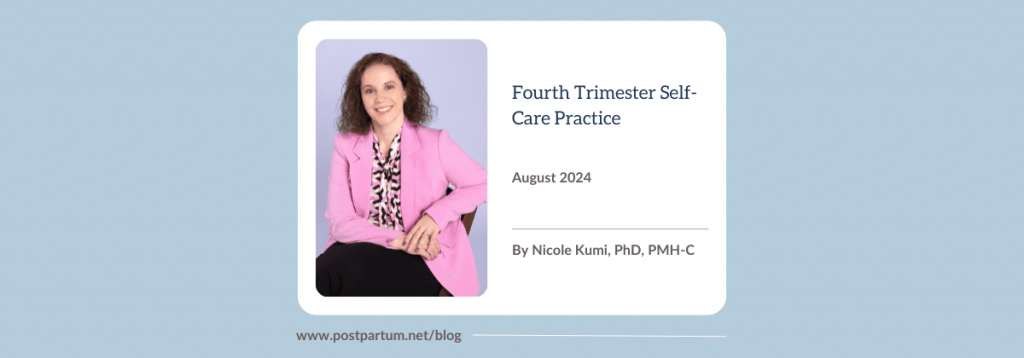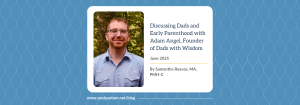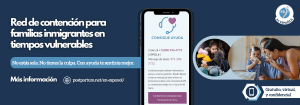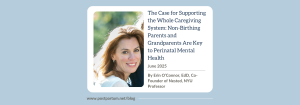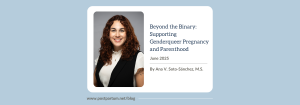By Nicole Kumi, PhD, PMH-C
So much of motherhood focuses on pregnancy and the birth of your baby, and while that is one of the most important aspects of becoming a mother, it is not the only one. Two births occur when you become a mom: the birth of your baby(s) and the birth of the mother, whether it is your first or third time becoming a mother. Each pregnancy, birth, and child are different, and the same goes for the mother. You will become a different version of yourself after each pregnancy, and the more aware you are of this, the sooner you can learn to support, love, and become the woman you are destined to be. Identifying self-care practices can assist you as you transition into this new role, and learn to find your footing as a mom. Self-care is much different than activities of daily living (showering and brushing your teeth) and is identified as activities that bring joy and a sense of renewal to someone.
A new identity has been formed
I’ve heard moms share with others that they “lost themselves” in motherhood. While I can understand that sentence, I don’t agree with the context of this statement. After the birth of your baby, an internal conflict begins to surface for moms. You will spend a portion of the postpartum period searching for your old self which can lead to frustration and resentment. You are searching for a person who no longer exists, who cannot exist at this point in time. When you become a mother, the first or third time, you become another version of yourself. When you struggle to realize this you will find yourself at a crossroads, missing someone who is not meant to be at this stage of your journey, and feeling resentful that your life has changed in this capacity. Much like you put systems in place to ensure your baby will come into this world and transition into your life effectively, you can use these same practices to ensure this version of you receives the same support.
Understanding self-care as you transition into motherhood
Self-care means something different to everyone, and it tends to be undervalued and under-discussed when talking about the postpartum period. This time in mom’s life can bring a variety of thoughts, emotions, and new behaviors, and these all may require new coping mechanisms. As you become a new version of yourself, you can develop and implement strategies that will assist you as you find your place in your new role.
Getting started
Having some general information normalizing the challenges associated with transitioning into motherhood can be helpful, even more so when you have somewhere concrete to start. Motherhood can feel overwhelming at times, and adding more to your plate can leave you feeling ready to give up before you begin. Take it slow and follow the points below to begin building a solid routine for yourself to support your journey of redefining who you want to be.
- Socialize. You will find yourself spending a lot of time in one or two rooms of your environment and with your baby about 98% of the time. It is ok to socialize, virtually or in person, to provide you with stimulation.
- Go outside. A change of scenery at least once a week is refreshing.
- Physical movement. Walking, running, cycling, and weight training can improve heart health and positively impact mental health.
- Proper nutrition. Caring for your body and fueling it with adequate amounts of protein, fruits, and vegetables can create some clarity.
- Activities of joy. Finding new hobbies or activities that bring you joy can provide an outlet for emotions.
- Boundaries. Learning to set and enforce boundaries will assist you with feeling less overwhelmed and somewhat structured.
- Developing a daily routine. This can provide structure when life feels chaotic.
- Daily mantras. Create a daily mantra for you to follow that supports this current season of motherhood. Learn to be kind to yourself first thing in the morning and reflect upon your current strengths so that building upon them feels like second nature.
- Setting intentions. Each night when you get into bed, think about the next day and what you hope to accomplish as it relates to your life. Start small and then build on them. The more consistently you adhere to these intentions, the easier it will feel and your confidence will build.
- List your strengths. Pregnancy and childbirth are not easy stages of a mother’s life, and you have probably overcome and managed a significant amount of challenges and stressors resulting in resilience and strengths you didn’t once have. Highlighting those rather than your shortcomings will assist you as you transition into motherhood.

Invest in personal development practices
This is where the magic happens. You are given an opportunity to rewrite your story, your purpose, who you are, and what you want. This is where you are reborn and learn to redefine motherhood and what it is going to look like “on you.” Get creative in this space, lean into the things that are pulling you close and the people who are aligned with where you want to be, and just watch how you begin to evolve. Some areas to consider related to personal development and growth:
- There will never be a perfect time. The longer you wait to work on yourself, the more time passes, leaving you frustrated and overwhelmed with “what you need to do.”
- Learn to overpour. Some of the happiest mothers are the ones who drop the guilt, pour into their own cups, and let the overflow work for them. Smarter vs. harder.
- Stick it out. You are the best project you will ever work on, which means things will get challenging. Don’t ever quit on yourself. You and your kids deserve the whole you.
- Draft an open letter to yourself. Write a goodbye letter to the version of you present before this birth and thank her. She has done a lot for you and has carried you this far. You need to say goodbye to her for this new version to evolve. The two versions cannot co-exist.
- Journaling. Do some free writing about who you want to be in this next season and explore what it is going to take to get there. Get as specific as possible, listing the characteristics you possess and the ones you hope to develop along the journey.
- Maximize your time. You’d be surprised how much time you have hidden in pockets of social media, etc. Evaluate when you can start working on what you truly want to happen.
Trial and error
Much like the new practices you learn to incorporate with your baby, most self-care practices are created after extensive trial and error. Some of these practices will carry you far beyond the postpartum period, being tweaked with each season of life. Some of these practices will serve a purpose in your life for a specific season and never be utilized again. As you continue to grow and evolve as a mother and an individual, you will recognize what works best for you. The most important of these practices is to stay consistent and be kind to yourself.
Postpartum Planning for Expectant Parents
Learn More About Perinatal Mental Health Disorders
Get Help

